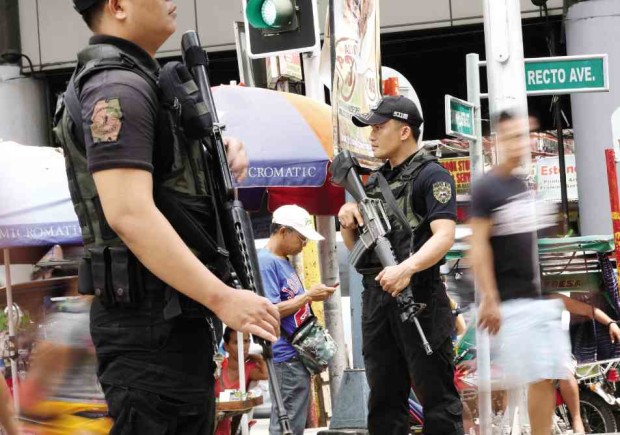
HEIGHTENED SECURITY. Members of SWAT-SRU (Special Reaction Unit) patrol crowded areas along Claro M. Recto Avenue in Manila, following an explosion that killed 14 people on Friday in a night market in Davao City. MARIANNE BERMUDEZ
Police in Metro Manila have been placed on full alert status following an explosion in a night market in Davao City on Friday which killed at least 14 people and wounded 74 others.
National Capital Regional Police Office (NCRPO) Chief Supt. Oscar Albayalde declared full alert status in Metro Manila effective 12:01 p.m. Saturday to “step up the security in the region.”
Under the full alert status, all district directors were ordered to set up checkpoints in strategic places, and to increase police visibility in all vital installations, malls, churches, train stations and all places of convergence.
“We are stepping up security measures for everyone’s safety. All community activities remain normal, we will not allow lawless elements to derail our path towards peace. It will still be a weekend for families,” the NCRPO public information office said.
Members of the Special Reaction Unit, Tactical Motorcycle Riding Unit and Public Safety Battalion were deployed to strategic areas in the metropolis.
Checkpoints and Oplan Sita would also be conducted along all roads leading to airports and seaports.
President Duterte declared a “state of lawlessness” early Saturday in the aftermath of the explosion but clarified that it was not a declaration of martial law.
The Abu Sayyaf owned up to the deadly attack, Interior Secretary Mike Sueno said. But the Abu Sayyaf later blamed it on its allied group Daulat Ul Islamiya.
In Manila, six police stations have been placed on full alert and were augmented with 200 additional personnel. These police stations in the country’s capital, which has 11 stations, cover Malacañang Palace, the US Embassy, universities, sea ports, bus terminals, old churches and LRT stations.
The city is also home to vital government structures like the Supreme Court and the Court of Appeals.
The Southern Police District would also set up checkpoints at the metro’s entry and exit points in Las Piñas, Parañaque and Muntinlupa.
Albayalde said what the police were doing was a “proactive security measure to prevent what happened in Davao City.”
Albayalde personally led the inspections at the Ninoy Aquino International Airport Terminals 2 and 3, MRT Taft station and bus terminals along Edsa in Pasay City, and the Market! Market! mall in Taguig City.
The checkpoints were set up as early as 2 a.m. on Saturday outside Naia by members of the Southern Police District—some armed with assault rifles. However, the checkpoints caused heavy traffic along Andrews Avenue and Airport Road.
In one of the bus terminals, a security officer said the police told them to keep their eyes on suspicious individuals and baggage. He said the commuters welcomed the heightened security.
The Quezon City Police District (QCPD) also placed the city under lockdown yesterday following the Davao City blast.
Senior Supt. Guillermo Eleazar, the QCPD head, said they have already deployed police personnel to man strategic areas in the city’s 110 entry and exit points to deter any possible attacks.
Eleazar also dismissed that the bomb threat on Thursday at UP Diliman was related to the attack in Davao, saying it was a “hoax.”
Eleazar yesterday led the inspection of various transport hubs in the city, such as the Araneta Center bus terminal and the LRT Roosevelt and Balintawak stations.